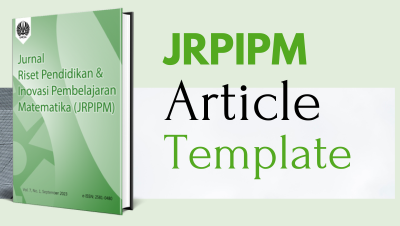Pemahaman Siswa SMP Perempuan Berkemampuan Rendah pada Masalah Kalimat Matematika
DOI:
https://doi.org/10.26740/jrpipm.v1n2.p64-72Keywords:
Understanding, Mathematical word problem, High CompetenceAbstract
Abstrak.
Fokus masalah dalam penelitian ini adalah pemahaman siswa SMP pada masalah kalimat matematika karena hal ini sangat penting dan mempengaruhi kemampuan siswa dalam memecahkan masalah kalimat matematika. Adapun tujuan penelitan ini adalah untuk mendeskripsikan pemahaman siswa SMP perempuan dengan kemampuan matematika rendah pada masalah kalimat matematika. Subjek penelitian ini adalah satu orang siswa SMP perempuan kelas VIII yang mempunyai kemampuan matematika rendah. Instrumen penelitian ini adalah peneliti sendiri dengan instrumen pendukung yaitu soal tes kemampuan matematika, soal tes pemahaman pada kalimat matematika dan pedoman wawancara. Hasil penelitian yang diperoleh adalah bahwa pemahaman subjek perempuan pada masalah kalimat matematika yaitu pada komponen pemahaman interpreting subjek menginterpretasi masalah tersebut dengan menggunakan kalimat sendiri secara lengkap. Sedangkan pada komponen pemahaman summarizing subjek tidak menyatakan kalimat matematika dengan menggunakan notasi matematika akan tetapi dengan menggunakan kata-kata. Pada komponen pemahaman inferring subjek menyelesaikan masalah kalimat matematika secara terperinci dengan menggunakan perhitungan perkalian yang dituliskan secara lengkap dan subjek menyimpulkan jawaban sesuai dengan pertanyaan yang diajukan pada masalah kalimat matematika. Pada komponen pemahaman explaining subjek menjelaskan setiap langkah penyelesaiannya secara rinci serta menuliskannya pada hasil pekerjaanya.
Abstract.
The focus of the problem in this study is an understanding of junior high school students in mathemarical word problem because it is very important and affects the student's ability in solving mathematical problems sentences. The purpose of this research is to describe the understanding of female junior high school students with low mathematic competence in mathematical word problem. The subjects were a junior high students of class VIII women who have low mathematic competence. The instrument of this study is the researchers themselves with instruments that support mathematic competence test questions, test questions on sentence comprehension of mathematics and interview guidelines. The results obtained is that the understanding of the subject matter of women in mathematical word is on understanding components of interpreting the subject interpret these problems by using their own sentences in full. While on the subject summarizing understanding of the components do not declare the sentence mathematics using mathematical notation but by using words. On the subject component inferring understanding solve problems detailed mathematical sentence using the multiplication calculation is written in full and in accordance with the subject concludes answers to questions on the issue of mathematical sentence. In the component of understanding explaining the subject to explain each step of the solution in detail and write it on the results of his work.
References
Pearce, D. L., Bruun, F., Skinner, K., & Mohler, C. L. (2013). What Teachers Say About Student Difficulties Solving Mathematical Word Problem in Grade 2-5. International Electronic Journal of Mathematic Education Vol 8 No. 1, 3-19.
Gooding, S. (2009). Children's Difficulties With Mathematical Word Problem. Proceedings of The British Society For Research Into Learning Mathematics.
Seifi, M., & et all. (2012). Recognition Of Student's Difficulties In Solving Mathematical Word Problems From The Viewpoint Of Teachers. Journal Of Basic and Applied Scientific Research.
Langeness, J. (2011). Methods To Improve Student Ability In Solving Mathematics Word Problems. Dipetik September 24, 2013, dari www.hamline.co.iy
Hadiyan, A. (2007). Penelusuran Tingkat Berpikir Geomteri Siswa Laki-laki dan Perempuan SMPN 1 Karksanan Probolinggo Berdasarkan Teori Van Hiele. Surabaya: PPs UNESA TESIS.
Zu, Z. (2007). Gender Differences In Mathematical problem Solving Patterns : A Review Of Literarture. International Education Journal 8(2), 187-203.
Gallagher, A. M. (2000). Gender Differences In Advanced Mathematical Problem Solving and Arithmetical Reasoning. Journal of Experimental Child Psychology 75, 165-190.
Pajares,F. (1996). Self-Efficacy Beliefs and Mathematical Word Problem Solving of Gifted Student. Contemporary Educational Psychology, 21, 325-344
Jafar. (2013). Membangun Pemahaman Yang Lengkap (Completely Understanding) Dalam Pembelajaran Konsep Grup. KNPM V Himpunan Matematika Indonesia.
Minggi, I. (2010). Proses Intuisi Mahasiswa Dalam Memahami Konsep Limit Fungsi Berdasarkan Perbedaan Gender.Disertasi. Surabaya: Universitas Negeri Surabaya.
Rohana. (2011). Pengaruh Pembelajaran Berbasis Masalah Terhadap Pemahaman Konsep Mahasiswa Prodi Pendidikan Matematika FKIP Universitas PGRI Palembang. Prosiding Seminar Pendidikan Matematika Universitas PGRI Palembang Pada Tanggal 27 Juni 2011.
Asdar. (2012). Profil Konflik Kognitif Mahasiswa Dalam Pemahaman Ditinjau Dari Perbedaan Kemampuan Kalkulus. Disertasi. Surabaya: Universitas Negeri Surabaya.
Skemp, R. (1976). Relational Understanding Mathematic Teaching. 77, 20-26. Dipetik Oktober 23, 2014, dari http://www.grahamtall.co.uk/skemp/pdfs/instrumentalrelational.pdf.
Kilpatrick, J., & Findell, B. (2001). Adding It Up : Helping Children Learn Matematics. Diambil kembali dari http://www.nap.edu/catalog/9822.html
Krathwohl, D. R., & Anderson, L. W. (2001). A Taxonomy For Learning, Teaching and Assessing: A Revision Of Blooms Taxonomy Of Educational Objectives. New York: Longman.
Charles, R. (1987). Solving Word Problems. Research Into Pretice Mathematics. Pearson Education Inc.
Downloads
Published
How to Cite
Issue
Section
 Abstract views: 410
,
Abstract views: 410
, PDF Downloads: 466
PDF Downloads: 466






